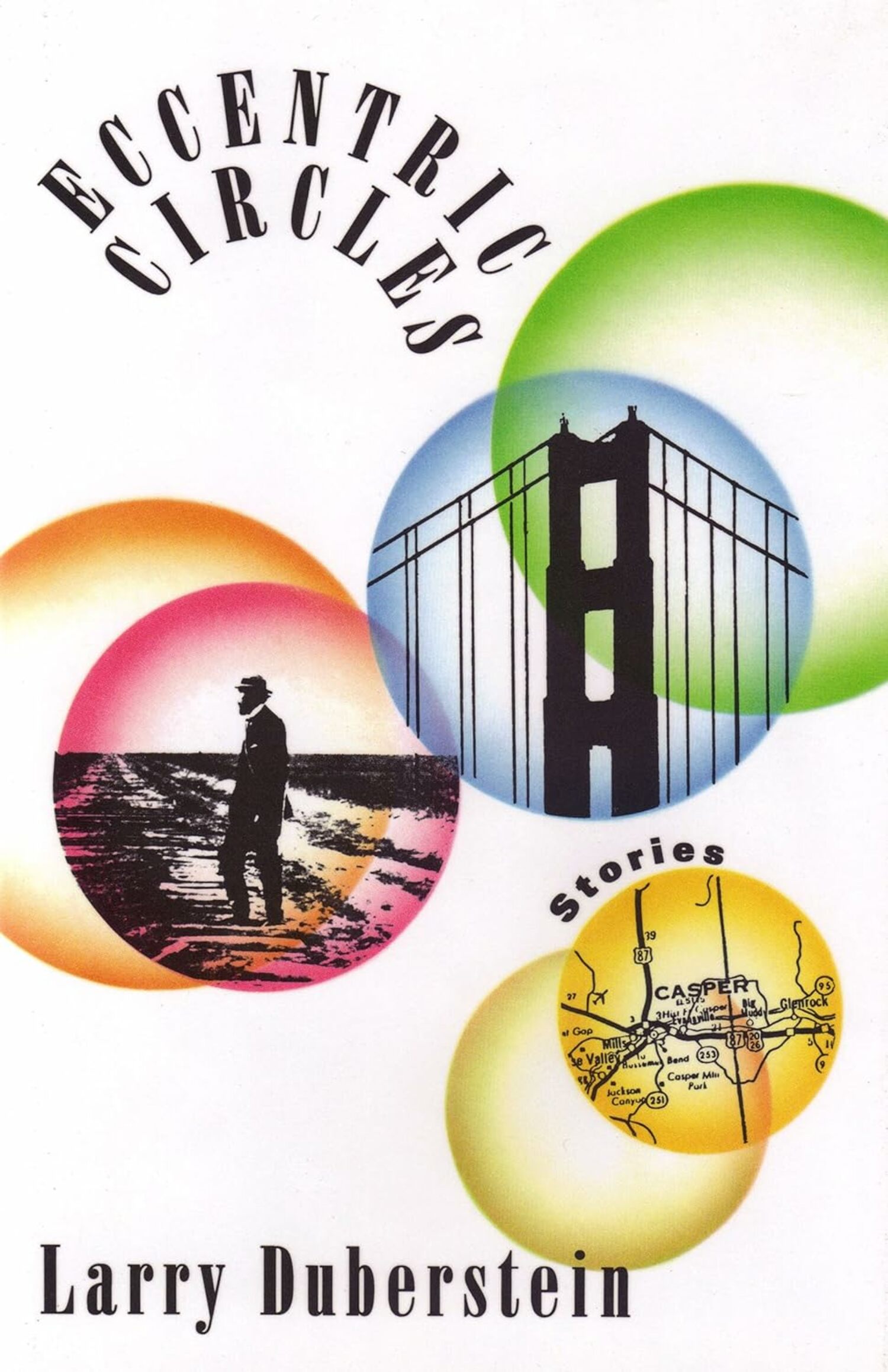
Signs that novelist Larry Duberstein’s engaging, diverse collection of short fiction “Eccentric Circles” was published 32 years ago are its absence of explicit violence, LGBTQ references, psychopathic characters and sketch-like endings. The book was originally published by The Permanent Press in Sag Harbor. What Duberstein’s carefully crafted 15 stories offer is worth revisiting, especially now, as many readers of contemporary fiction, depressed by the horrendous news of the day, seek escapism or fantasy or prefer to connect with nonfiction. All of which is not to say that Duberstein’s stories avoid reality. Just the opposite (the last word of the last story in the book is “real”). His protagonists tentatively, instinctively, engage others in ways that prompt them to carry on rather than descend or drift into the kind of destructive narcissism that defines our own time.
The stories involve family members, friends, acquaintances and strangers but go off in unexpected, sometimes bizarre directions. Situations at the start are not clear, but as the narratives evolve names and relationships become known. Being sympathetic, the stories suggest, may be more rewarding than being right — an important theme for our present day. The opening story, “The Second Craziest Person in Casper, Wyoming,” begins: “I knew something was wrong with this picture even before I opened the front door.” A beautiful naked woman is in the narrator’s bed. Not his beloved. The woman had come through a window. With her baby. Not your ordinary tale of infidelity and conscience, but a satisfactory — and funny — example of compassion.
Duberstein uses dialogue effectively to establish a sense of negotiation. In “Devereaux’s Existence,” for example, the protagonist has been arrested for being a peeping Tom (he is), and his witty, clever role-playing self-defense in court with the judge exemplifies his philosophy — “You cannot have — simply have — an existence, you must go out and exist it.” Harry spends much of his time in bars. ‘I’m a cliché… Once fairly prominent and well-respected, but in recent years etcetera etcetera. I’m a symptom of the times.’” But not a victim.
There’s a natural curiosity in Duberstein’s characters, an unnecessary need to know that gives the stories a sense of connecting, if only temporary. The mood is upbeat, the settings distinctively American. In “The Golden Gate Funeral March” the narrator and his older, estranged brother are going west because it was “Ma’s wish.” She’s with them in the car. Don’t ask how. The narrator is working-class, rough, authentic. He’s not one of those guys, he says, “who goes off to the Himalayas for sixteen years and shaves his head and then comes back down to announce that Life is a Hockey Puck or something of that ilk.”
In “Moving Water” Annie Riley sits at a picture window watching the dirt road, drinking her coffee — the ritual of her lone existence, unlike former times when Riley’s Pond was the center of activity. The story, wistful without being sentimental, shows her slowly warming to a young stranger in a pickup truck who comes by one day, trespassing for sure, to swim. Slowly, Annie eases into expectation of his arrival. Until he stops when the weather gets cool. She realizes then how central he had become in her life while being invisible in his. Images startle with originality, as the narrator in “The Undertaker’s Choice” finds himself “breast-stroking his way through a milling crowd” to place a bet. He decided to go to the race track after casual conversation with the undertaker who plays often and wins. Never mind that the funeral was for his own brother who had been in the mob.
Duberstein’s stories chronicle odd behavior but provide no causes or epiphanies. “The Last of Harpo Berkowitz” opens with the statement that Harpo Berkowitz needed to be helped out of a car a month ago. “He needed the help not because he was old or infirm, but because he was dead and it isn’t easy for a dead man to get himself from the trunk of a car.” The straight-faced declaration then moves to memory, as the narrator recalls his brief association with Harpo in high school, a thug to all, but the narrator hopes there may have been more to him. There wasn’t.
In the last story in the collection, “Catherine,” Dean picks up a dancer in a New Orleans bar whom he mistakes for a prostitute, but then offers to write her a check if she’ll spend the night with him. She’s petty, amiable, amused; he’s increasingly taken with her and she brings him home, then, dog tired, falls asleep, naked. In the morning he sees a rubber-band bracelet around her wrist (so, not totally naked) and bread in the toaster. He quietly takes the rubber-band, writes a note that he loves her, and leaves $5 for breakfast. As he slips out, he muses that the rubber-band, “innocent and ordinary” might be proof “that fate and dreams were often less so, yet no less real.” And more comforting.